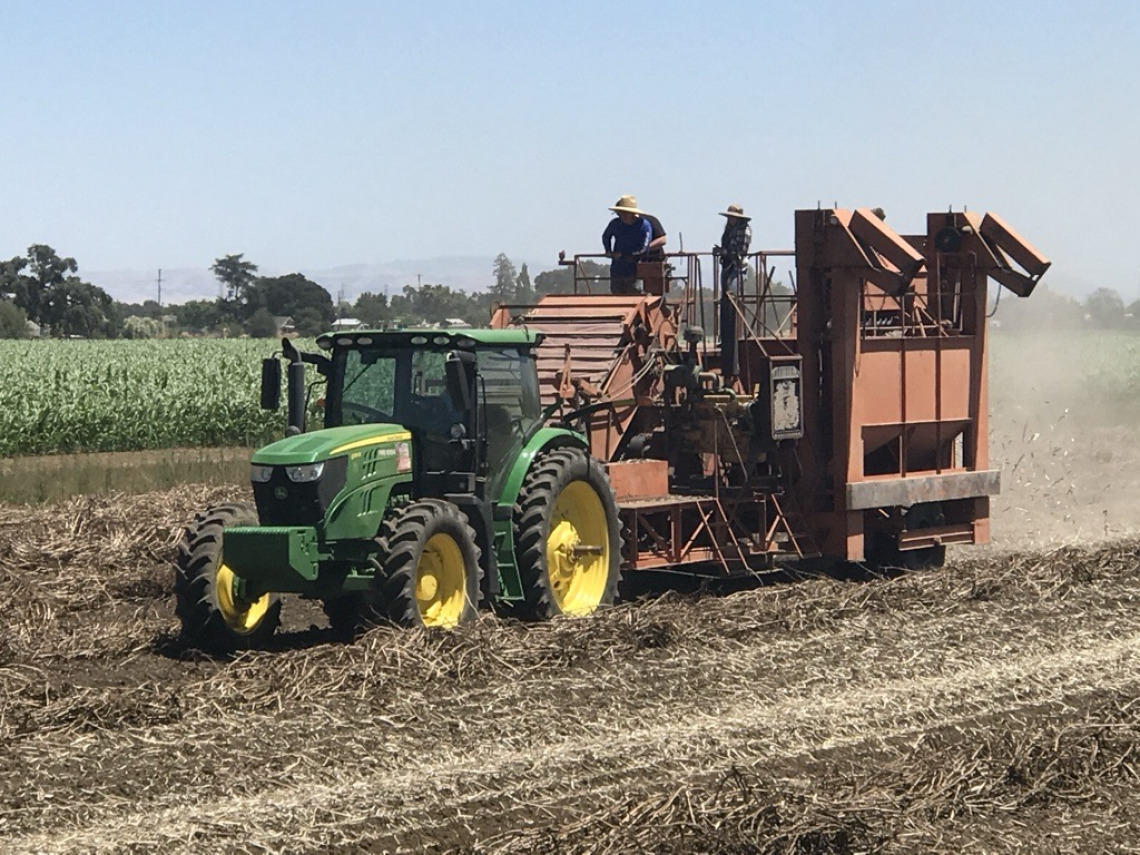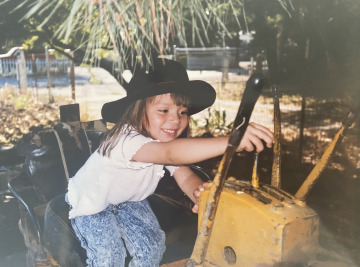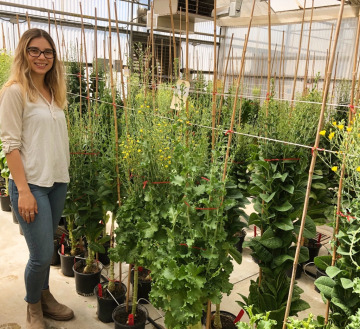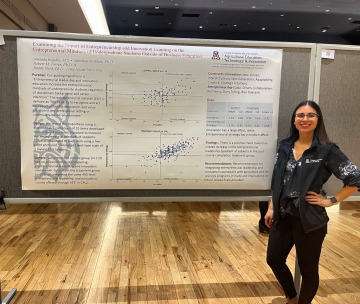Advancing equity in agricultural leadership
Student Profile: Amanda Bogden

At 24 years old, Amanda Bogden oversaw the production of 250 acres of broccoli, sunflower and zinnia crops in central California. Rain or shine, she would drive her pickup truck through the fields, visiting her work crews and checking on progress. And one thing became abundantly clear: there is a leadership inequity looming in the agriculture industry.
Now, a doctoral candidate in the field of education, Amanda is on a mission to reshape the landscape of agricultural leadership, particularly for Latinx communities. We sat down with her recently to discuss her journey from her family's ranch to the halls of academia.
Roots in the soil: childhood on the ranch

Growing up on a rural California ranch teeming with orchards and livestock, Amanda developed a love for agriculture and the land from an early age. Her mother’s family are farmers back in Mexico where they grow sugarcane and make Panela cheese. As a teenager, Amanda tended her FFA garden filled with artichokes, squash, tomatoes and peppers and rode her own tractor around their 7-acre orchard laden with persimmons, walnuts, almonds, plums, apples and oranges.
Raised by a single mother who worked tirelessly to support her, Amanda learned the value of perseverance and hard work. Despite the challenges they faced, her mother's unwavering support fueled Amanda's dreams of pursuing higher education and making a difference in the world.
Nurturing a passion: UC Davis and agricultural education
Amanda initially began a degree in animal sciences at UC Davis. She quickly learned, however, that her heart wasn’t in it. She wanted to be with the plants she’d always loved, and so, pivoted her major to agricultural and environmental education. Following her undergraduate studies, Amanda's journey led her to the front lines of agricultural work.

Amanda spent five formative years working in the greenhouses and crop fields of central California. Here, she said, she began to notice the absence of Latinx people in leadership. With her heritage tracing back to Mexico, Amanda felt the weight of this disparity.
"While working in agriculture, I noticed an industry-wide lack of representation of Latinx individuals in managerial positions. As a part of the Latinx community, I saw how others are often limited to labor-intensive roles, which perpetuates the cycle of inequity," she said. "I worked to empower the people working in my crews and advocate for better working conditions, but the harsh reality of working in an industry that often prioritizes profit over people eventually led me to burnout."
She realized she needed a different approach – one focused on preparing future generations to break the cycle of inequality from within.
From field to classroom: a call to action
During this period, Amanda was studying in the master of agricultural education program at the University of Arizona, with a professional emphasis. Her initial career goal had been to find a job in corporate leadership within the agricultural industry.
"But as I was working in the production side of agriculture, I knew that I wanted a different path. I was looking for a new way to enact tangible change while still holding true to my agricultural roots," she said.
Towards the end of her master’s program, she was encouraged to follow her passion by continuing her studies and conducting research. Amanda gives credit to Matt Mars, Ph.D., professor in the Department of Agricultural Education, Technology & Innovation, for inspiring her to pursue a doctorate in education, which would allow her to challenge the inequities she had observed in the workplace and prepare incoming students for the emerging agricultural landscape.
Motivated by her experiences in the field and guided by a desire to empower future generations, she began a Ph.D. program in higher education.
A research focus: career readiness of Latinx students

With a focus on career readiness among Latinx students in agricultural and environmental sciences, Amanda's current research seeks to bridge the gap between education and opportunity.
Her dissertation, titled "Career Readiness of Latinx students in colleges of agriculture and life sciences," delves into the unique challenges and opportunities faced by Latinx students in pursuing careers in the agricultural industry. Through a mixed-methods approach, Amanda aims to shed light on the resources – both familial and institutional – that shape career trajectories of these students, ultimately paving the way for a more inclusive and equitable future.
As of writing this profile, Amanda has successfully developed and defended her dissertation proposal.
A continuing journey: final thoughts
For Amanda, the path to higher education has been marked by sacrifice and resilience. Leaving behind a stable career and financial security, she embraced the challenges of a Ph.D. program, all while navigating personal loss and responsibilities. She recalls experiencing culture and environmental shock, moving from the rolling hills of California to the desert of Tucson. As a first-generation graduate providing some financial support for her family, Amanda's journey is a testament to the power of perseverance.
For current students, Amanda offers this advice: Don’t be afraid to ask for help. Take advantage of whatever comes your way. If someone sees potential in you, go for it. Build a support system – if not family, then friends. And have interests outside of school.
Amanda has just been named a 2024 USDA HSI (E. Kika De La Garza) Fellow. She currently applies her knowledge and passion for career readiness as the Internship Program Manager within the CALES Career Center.* She hopes her work will be used by colleges with a large Hispanic population to improve career readiness initiatives, ensuring graduates are prepared with the skills they need for leadership. At the conclusion of her program, Amanda plans to continue to work for a systemic shift toward equity through career readiness.
*Note: though Amanda works for the CALES Career Center, she is not using any data from the CALES Career Center, nor any student data from the University. All of her data will be collected from selected participating Hispanic Serving Institutions.
